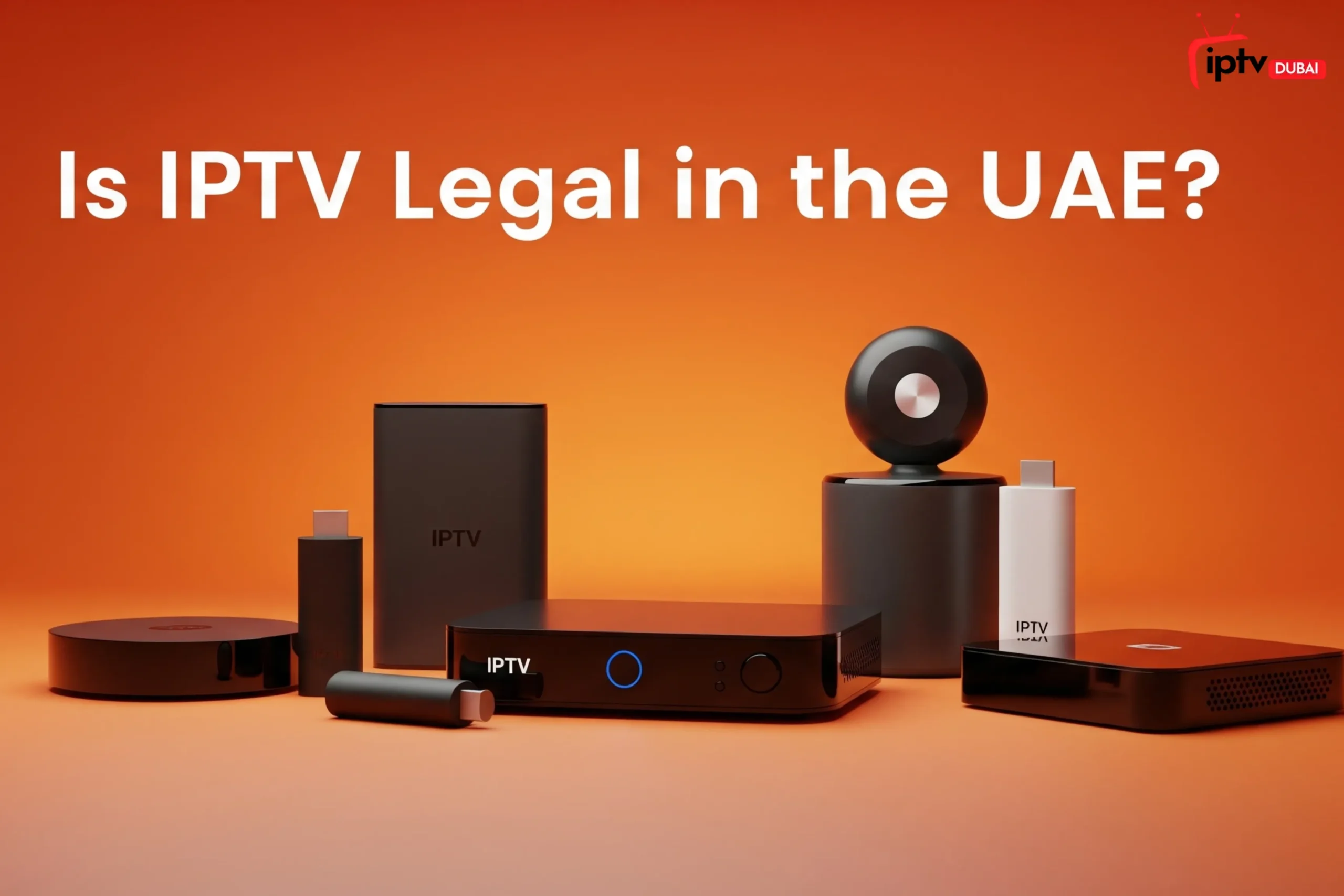Blog
Is IPTV Legal in the UAE? (Explained with Laws)

In recent years, IPTV (Internet Protocol Television) has gained widespread popularity worldwide, including in the UAE. Whether you’re using IPTV for streaming your favorite shows, sports events, or movies, it’s crucial to understand the legal status of IPTV in the UAE to avoid potential fines or legal issues.
This guide will walk you through everything you need to know about the legality of IPTV in the UAE, including the laws, restrictions, and tips for using IPTV services safely and legally.
As a leading tech and entertainment provider in the UAE, iptvdubai.net, your trusted online store based in Dragon Mart, Dubai, is committed to keeping you informed about the latest legal updates.
Let’s dive into the legal framework governing IPTV in the UAE.
What Is IPTV and How Does It Work?
Before diving into the legalities, let’s quickly define what IPTV is and how it works:
IPTV is a service that delivers television programming via the internet rather than traditional satellite or cable signals. By using an internet connection, IPTV offers access to a wide range of live TV channels, on-demand movies, and streaming services.
IPTV services can be accessed via:
- Set-top boxes
- Smart TVs
- Streaming devices like Roku or Apple TV
- Mobile devices using IPTV apps
IPTV allows users to access content that might not be available through regular satellite providers, which is one of the reasons it’s so appealing.
Legal Status of IPTV in the UAE
1. IPTV Is Legal but Regulated
Yes, IPTV is legal in the UAE, but it is heavily regulated. The government monitors the content being accessed via IPTV services and imposes strict laws on unlicensed IPTV services.
2. Regulating Authorities:
The UAE’s National Media Council (NMC) and the Telecommunications and Digital Government Regulatory Authority (TDRA) are the primary bodies responsible for regulating broadcasting and internet services in the country. These authorities have strict guidelines regarding the distribution of content, particularly when it comes to copyrighted material.
- Legal IPTV: The government allows IPTV services that are licensed by the appropriate authorities, ensuring compliance with local laws.
- Unlicensed IPTV: Streaming services or IPTV providers that operate without official licensing are illegal and can face significant penalties.
3. Copyright Laws and Piracy Issues
In the UAE, piracy is a serious offense. The government has made it clear that accessing or offering pirated IPTV streams is illegal. Pirated content includes any broadcast material, such as sports events, movies, and TV shows, that are not authorized by the legal broadcasters.
- Pirate IPTV services: These are services that bypass the need for licensing and distribute illegal content, often at a much lower cost. Users accessing these services may face penalties, including fines and legal actions.
4. Fines for Using Unlicensed IPTV Services
Using unlicensed IPTV services that stream pirated content is strictly prohibited in the UAE. The penalties for using such services can be severe and include:
- Heavy fines: Depending on the severity of the offense, fines can be substantial.
- Confiscation of devices: Devices used to access illegal IPTV services may be seized by authorities.
- Criminal charges: Repeated or severe violations could lead to criminal charges and legal proceedings.
It is essential for users to verify the legitimacy of the IPTV services they subscribe to in order to avoid these penalties.
Laws and Regulations Regarding IPTV in the UAE
1. Federal Law No. 15 of 2009 on Media Content (Broadcasting)
This law primarily regulates media content and broadcasting. IPTV providers operating in the UAE must comply with this law, ensuring their content does not promote illegal or harmful material.
2. Telecommunications Regulatory Authority (TRA) Rules
The TRA regulates all internet and telecommunications services in the UAE. According to the TRA’s guidelines:
- IPTV services must be licensed by the government.
- IPTV providers are required to ensure that all content they distribute complies with UAE laws, including content censorship and broadcasting standards.
3. Content Censorship
The UAE government imposes strict content censorship laws, particularly regarding sensitive or controversial material. This includes blocking access to content related to:
- Political views that oppose the government
- Adult content
- Content related to alcohol or drugs
- Religious extremism
IPTV providers must ensure that their services do not provide access to restricted content, and any violations may lead to service shutdowns or fines.
How to Access Legal IPTV Services in the UAE
For users looking to access IPTV legally in the UAE, it’s essential to subscribe to licensed and authorized services. Here’s how you can ensure you’re using a legal IPTV service:
Choose Established Providers
Only choose well-known and licensed IPTV services operating in the UAE, such as:
- OSN: A popular legal IPTV provider offering a range of international content.
- Du TV: A UAE-based IPTV service offering a variety of local and international channels.
- Etisalat TV: Another well-known service offering IPTV with a wide selection of content.
These services comply with the UAE’s regulations and offer content in line with the country’s laws.
Verify the License
Always verify whether the IPTV service you are subscribing to is licensed by the National Media Council (NMC) or the Telecommunications and Digital Government Regulatory Authority (TDRA). If the service does not have a license, it may be distributing unlicensed content, which could land you in trouble.
Avoid Free IPTV Services
Avoid subscribing to free IPTV services, especially those that promise access to premium content like sports channels, movies, and international shows. These services often operate illegally, distributing pirated content, and using them could lead to serious legal issues.
How to Protect Yourself from Legal Trouble
1. Check Content Legitimacy
Always ensure the content being streamed is licensed and authorized. Services that offer access to live sports events, movies, or shows should be verified with the content owners or rights holders.
2. Subscribe to Local, Trusted Providers
As mentioned, services like du, Etisalat TV, and OSN provide legal and licensed IPTV access. These providers offer a variety of international and local content without the risks associated with pirated services.
3. Install a VPN with Caution
Using a VPN is a common workaround to access geo-restricted content. However, it is important to note that using a VPN to access pirated IPTV services is illegal. Always ensure that the VPN is used for accessing legal content only.
Final Thoughts: Is IPTV Legal in the UAE?
In conclusion, IPTV is legal in the UAE, but it comes with specific rules and regulations. The key takeaway is that while legal IPTV services are available, pirate IPTV services are not permitted and can result in severe penalties. To stay on the right side of the law, always use licensed IPTV services, avoid free or unauthorized IPTV providers, and stay informed about the latest laws in the country.
For those seeking reliable and legal IPTV services, iptvdubai is here to provide you with trustworthy options and the latest tech. Whether you’re in Dubai or anywhere across the UAE, choose licensed IPTV services to avoid the risks of piracy and enjoy seamless, legal streaming.







